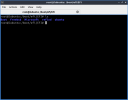Hello everyone. I have a computer with Windows, Arch and Lubuntu and all these systems are booting from a Multi-Boot. Recently, I decided to download freebsd for some tests and decided to put the OS in my multi-boot. I allocated 20 GB, installed in UEFI/GPT and made 3 partitions from UFS installation: freebsd-boot, freebsd-swap and freebsd-ufs. When I boot the GRUB or rEFInd or Boot Priority from BIOS MENU, the freebsd doesn't appear, even installed on my computer. I opened gparted on Lubuntu and the 3 partitions (ufs, boot and swap) appear without any problem.
Using the single user in FreeBSD installer, I executed these two commands:
gpart set -a active /dev/ada0
gpart set -a bootme -i 13 /dev/ada0 (my freebsd-boot is installed on ada0p13)
Now Windows, Arch and Lubuntu boot systems do not appear in the BIOS menu, although nothing from the HD was deleted.
I believe the freebsd boot is forced to be in the top position at boot, but no system now boots, including freebsd.
Can I recover other OS boots besides freebsd, without needing to format the entire HD and be able to boot freebsd?
Sorry if this sounds like a noob question, because as the HD partitions hasn't been deleted, to recover the files I can use a Linux distro and access the partitions without any problem (if there is no other way to fix).
I used the commands from these links:

 unix.stackexchange.com
unix.stackexchange.com

 forums.freebsd.org
forums.freebsd.org
Using the single user in FreeBSD installer, I executed these two commands:
gpart set -a active /dev/ada0
gpart set -a bootme -i 13 /dev/ada0 (my freebsd-boot is installed on ada0p13)
Now Windows, Arch and Lubuntu boot systems do not appear in the BIOS menu, although nothing from the HD was deleted.
I believe the freebsd boot is forced to be in the top position at boot, but no system now boots, including freebsd.
Can I recover other OS boots besides freebsd, without needing to format the entire HD and be able to boot freebsd?
Sorry if this sounds like a noob question, because as the HD partitions hasn't been deleted, to recover the files I can use a Linux distro and access the partitions without any problem (if there is no other way to fix).
I used the commands from these links:
FreeBSD 10 does not boot after clean install
Latest FREEBSD 10 does not boot after clean installation. Installed using this image: FreeBSD-10.0-RELEASE-amd64-memstick.img Used Guided Partitioning, where I selected my only hard drive, chose ...

Solved - Freebsd won't boot after clean install
Hey guys, I've been trying to install FreeBSD on one of my computers for a while now. It's been consistently getting through the installation without error, but when I try to boot from the new system I just get a flashing _ I've tried using a variety of different settings. The most recent...

